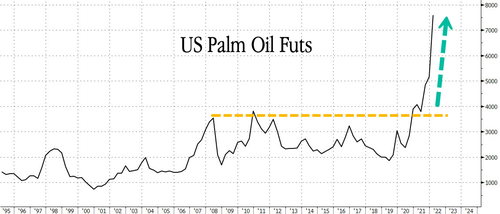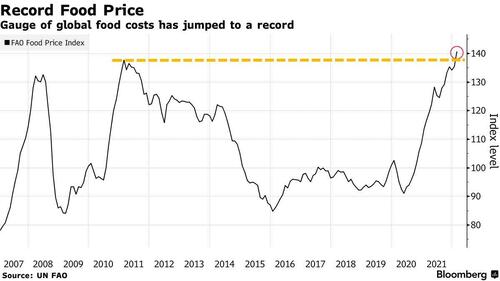Cooking Oil Shortage Sparks Panic Buying In Indonesia
Indonesia, the world’s largest exporter of cooking oil, will reduce exports of edible oils as a domestic shortage sparks panic hoarding among households, a sign of rising protectionism around the world as countries deal with record-high food prices, according to Bloomberg.
Trade Minister Muhammad Lutfi announced new rules Wednesday for palm oil exporters to increase domestic shipment volumes from 20% to 30% to ensure local consumers have access to affordable cooking oil.
The move by the Indonesian government comes as dwindling cooking oil supplies has unleashed record high prices. Togar Sitanggang, vice chairman of the Indonesian Palm Oil Association (Gapki), said in a pre-recorded speech at a conference that households are panic buying edible oils as a shortage emerges. They’re buying more than they need worsening the shortage, he said.
Palm oil for May delivery in Malaysia soared 10% to $1,687 per ton, a new record high for the contract and most active contract with the largest daily gain since 2001. Palm and soybean oil also rose to a record in Chicago.
“All those who were short in the market have had their hearts pulled out,” said Dorab Mistry, a veteran trader and director at Godrej International Ltd. “This is a knee-jerk reaction. I don’t think these prices are sustainable.”
Russia’s invasion of Ukraine has thrown global food supply chains into disarray. Governments worldwide are beginning to take proactive measures that are considered protectionist to safeguard domestic food supplies. On edible oils, Ukraine and Russia export about 80% of sunflower oil and a quarter of the world’s wheat — as we’ve noted, shipments from the region have been halted or limited due to conflict or sanctions. Compound snarled supply chains and food shortages from the COVID era with the latest disruption, and it appears record-high food prices will be sticking around.
Food protectionism is also happening in Hungary, Argentina, Turkey, and Moldova. The world is on a collision course of high prices and shortages could trigger social instabilities in these emerging market economies.
Tyler Durden
Wed, 03/09/2022 – 21:40
via ZeroHedge News https://ift.tt/wtNH7oD Tyler Durden

